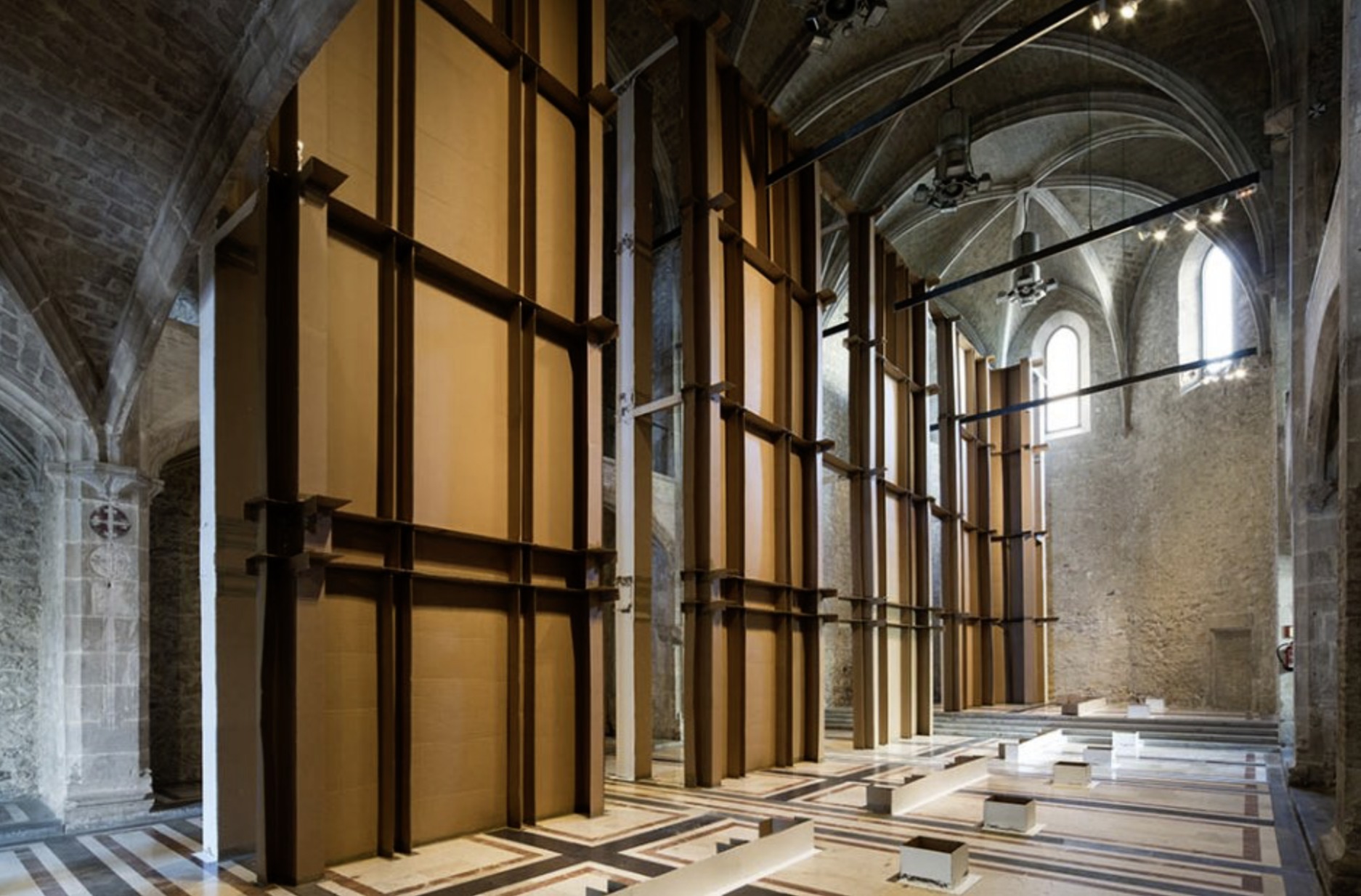Carlos Bunga
Capella
30 Oct 2015 - 07 Feb 2016
CARLOS BUNGA
Capella
30 October 2015 - 7 February 2016
Curator: Bartomeu Marí
The origin of Carlos Bunga’s work (Porto, 1976) is painting, not in the technical or material sense, but from a conceptual point of view. The flatness of the traditional picture surface spurred the artist to look for alternatives outside the conventions of two-dimensionality. Bunga prolonged the surface of the painting beyond the frame and the wall and searched in three-dimensional space for a solution to the limit, to the endgame. In doing so, he uses industrial materials to ‘put a skin’ on his constructions: a first layer of glue gives consistency to the cardboard, which reacts to the humidity and also to contact with the paint. The end result is due to the expansion and contraction of the cardboard and the chemical elements, and lies between the quality of the anonymous product and the individual projection of the author’s signature.
In his intervention at the Capella MACBA, Bunga begins with two elements: the original function of the building (Catholic worship) and the avatars of its environment, the Raval neighbourhood and, by extension, the city of Barcelona. In his first work in our city, the artist confirms his interest in the urban, in that which links construction to the living experience. His fundamental inspiration is the public space and those accidents that inhabit it. Originally, the Capella was a scene for the exercise of faith, its rituals, hierarchies, symbols and narratives. Built in the fifteenth century and deconsecrated during the ecclesiastical confiscations of Mendizábal (1835–40), it is preserved today as a skeletal space that plays host to both lay and civic events.
Bunga wants to connect present and past to recover the role of the space outside the conditions, speed and noise of the city, and to encourage the reflective attitude that it had when it was a place of worship. The artist is fascinated by all those acts and events that turn the individual into communal and the subjective into collective. At a time when museums and commercial centres incorporate the public square (or its metaphorical recreation) in their spatial vocabulary and want to recreate indoors the feeling of being outdoors, the notion of freedom of behaviour becomes a psychological fiction. We desperately need to believe we are free, and in all our exchanges with others we surround ourselves with codes, language, norms and grammar of gestures. The institutional space seems to establish itself as the opposite of what had previously been known as the public space.
Organisation and production: Museu d'Art Contemporani de Barcelona
MACBA is grateful to Barnices Valentine S.A. for providing the materials used in the current exhibition by Carlos Bunga.
Capella
30 October 2015 - 7 February 2016
Curator: Bartomeu Marí
The origin of Carlos Bunga’s work (Porto, 1976) is painting, not in the technical or material sense, but from a conceptual point of view. The flatness of the traditional picture surface spurred the artist to look for alternatives outside the conventions of two-dimensionality. Bunga prolonged the surface of the painting beyond the frame and the wall and searched in three-dimensional space for a solution to the limit, to the endgame. In doing so, he uses industrial materials to ‘put a skin’ on his constructions: a first layer of glue gives consistency to the cardboard, which reacts to the humidity and also to contact with the paint. The end result is due to the expansion and contraction of the cardboard and the chemical elements, and lies between the quality of the anonymous product and the individual projection of the author’s signature.
In his intervention at the Capella MACBA, Bunga begins with two elements: the original function of the building (Catholic worship) and the avatars of its environment, the Raval neighbourhood and, by extension, the city of Barcelona. In his first work in our city, the artist confirms his interest in the urban, in that which links construction to the living experience. His fundamental inspiration is the public space and those accidents that inhabit it. Originally, the Capella was a scene for the exercise of faith, its rituals, hierarchies, symbols and narratives. Built in the fifteenth century and deconsecrated during the ecclesiastical confiscations of Mendizábal (1835–40), it is preserved today as a skeletal space that plays host to both lay and civic events.
Bunga wants to connect present and past to recover the role of the space outside the conditions, speed and noise of the city, and to encourage the reflective attitude that it had when it was a place of worship. The artist is fascinated by all those acts and events that turn the individual into communal and the subjective into collective. At a time when museums and commercial centres incorporate the public square (or its metaphorical recreation) in their spatial vocabulary and want to recreate indoors the feeling of being outdoors, the notion of freedom of behaviour becomes a psychological fiction. We desperately need to believe we are free, and in all our exchanges with others we surround ourselves with codes, language, norms and grammar of gestures. The institutional space seems to establish itself as the opposite of what had previously been known as the public space.
Organisation and production: Museu d'Art Contemporani de Barcelona
MACBA is grateful to Barnices Valentine S.A. for providing the materials used in the current exhibition by Carlos Bunga.

